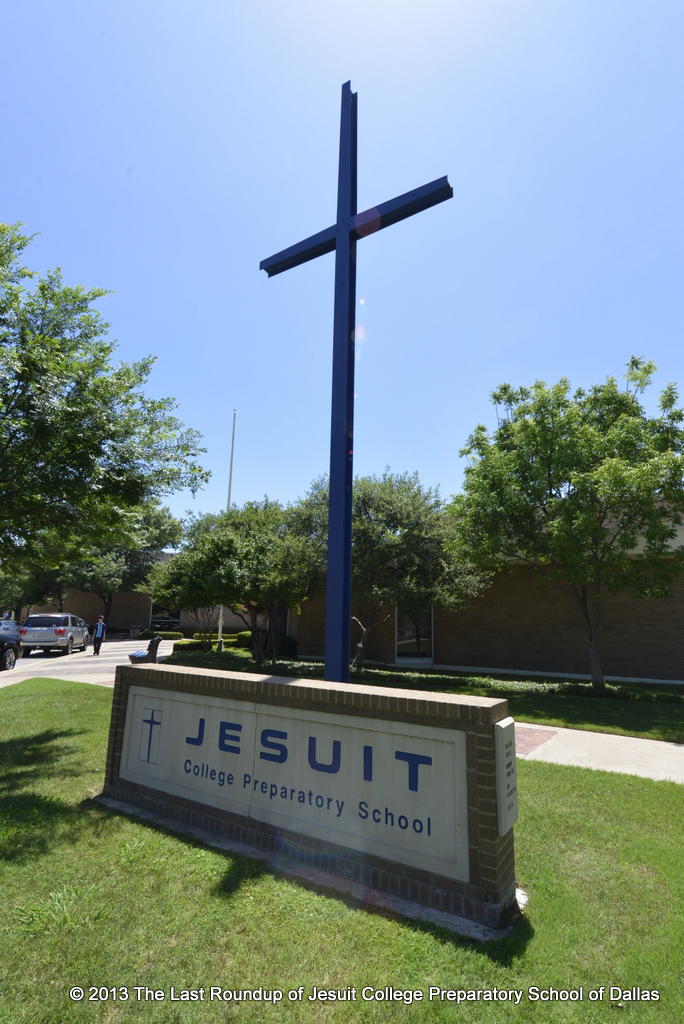“There were once these two olives hanging from this tree. One olive fell off the tree and onto the ground. The olive in the tree shouted to the other olive,”Are you okay???” And the olive on the ground yelled back,” OLLLLL-LLLLLLIIIIIIVVVVEEEE!”” Mr. Burrell kicked off the prayer service with this lighthearted joke on Friday, February 5th. The prayer service was centered around making the Jesuit community aware of diversity and ‘starting the conversation’ about how we can truly fulfill the points that we proclaim in the prayer of generosity.
Teach me, O God, to listen…
In his joke, Mr. Burrell made all of us realize how humor is communal, how it’s an invitation for everyone to share laughter together without anyone being excluded. But humor can also have a dark side. Some kinds of humor “can be malicious and can divide us,” noted Burrell. Then Burrell told the crowd a story of his first year of teaching at Jesuit, “I overheard a boy say, ‘That’s so gay.’ I didn’t know his intent or if he meant it as a joke, but we talked and I asked him to stop. Then the next day he said, ‘You’re so gay.’ And we had an additional talk about equating gay to stupid.” This anecdote serves as a shining example of how sometimes we forget that those who are different than we have their own dignity and if we say that we are Men for Others, then we are men for them as well. And when we refuse to listen to others, “particularly when we have wronged them,” we shut down the opportunity to be open to growth, taught Burrell. Being a Jesuit student and a man for others isn’t about the service hours, holding open doors, athletics, or high GPAs it’s about being “for and with others [different from us]…listening to them…accepting when we fall short and strive to get better,” said Burrell.
Lord, teach me to be generous to my brother,
To serve him as he deserves…
Senior Kassa Kassahun has gone to private, Catholic school for most of his life and noted, “I’m used to being the minority.” And when people thought of him, Kassahun thought they were thinking that he “[contrasted] the stereotypes of the typical black guy.” Then they’d nonchalantly say things like,”You’re the whitest black guy I know,” a statement that strips away one’s identity and made Kassahun “question himself.” “I used to just laugh it off, but honestly, these statements hurt,” he said, continuing to note the isolation these ‘jokes’ from classmates brought. Have we as a community served our brothers as they deserve? Do we understand this phrase?
To give to my brother and not to count the cost,
To fight for him and not to heed my wounds…
Carlos Gonzalez ‘16 came to America in the fourth grade with little knowledge of English and no knowledge of American society. He sat in class feeling “like an animal in the zoo,” complete with people staring at him and all he could think was “I’ve never seen this many blonde kids at once.” Gonzalez felt uncomfortable and out of place in his new environment. However, time passed, and he adjusted to the English language and American culture. He thrived in his middle school environment, diminishing his accent, and he even entered into Honors English! Time kept rolling on, and Carlos applied to and enrolled at Jesuit, “where [he] experienced racism for the first time.” The hurtful words he heard in sacred halls at Jesuit “became daggers that undermined me, my mother, my father, and my culture.” The ignorant boys who said these words always quickly responded with “It was only a joke, man” or “Chill out,” but it’s not funny. What does it mean to truly fight for my brother? Have we done that for our Brothers?
To toil for my brother and not to seek to rest,
To labor for him and not to ask for a reward,
except that in knowing that I love him…
Ethan Tsao ‘16 has been an Asian living in a “predominantly white, upper-middle class society for years.” “I’ve heard all the stereotypes,” he continued, “they’d say stuff like ‘Help me with with my math homework’ or ‘Of course you got a good grade on that test’ all because of my race.” He “didn’t think much of it at the time, but looking back, it hurt him greatly.” These offhand racist remarks downplayed his accomplishments and only made him “seek to conform more to fit in.” Tsao was losing his identity, and no matter how hard he would try, he could never be a preppy white boy like it seems everyone else is. But it’s okay that “we’re all different, it’s great to be different, and differences are things to be celebrated…We need to hold ourselves accountable for the little words or offhand remarks that attack others’ differences,” especially because our differences are what makes us who we are. What does it mean to really love my brother as God loves me? Have we shown all of our brothers the love they deserve?
Then the entire Jesuit community received a mission, to start the conversation about how we have treated our brothers to this point and how they deserve to be treated, no matter how different they look, talk, or any difference for that matter. Mr. Dondis prompted the audience to talk to the people around them and asked them to remember times when they have and have not done what is bonded above. A Jesuit student who wishes to remain anonymous stated, “I don’t know about the rest of the Terry Center, but, around me, nobody was really talking about the matter at hand and when walking out I didn’t hear a peep about the topic which we ALL listened to just minutes prior.” Although it may feel uncomfortable to talk about tough topics like this, “it’s vital to our community that we start the conversation,” remarked Bobby Turner ‘17.
When looking at past Jesuits who have been shining examples of what is listed above, we remember Father John LaFarge, whom Mr. Garrison brought up at the beginning of the service. Exemplifying the prayer for generosity, LaFarge fought against racism and anti-Semitism during World War II. He listened, served, gave, fought, toiled, and labored for his brothers, all without thinking of himself. In areas where we have failed our brothers, LaFarge has succeeded in his mission to live up to the unique Jesuit expectation of a Man for Others. LaFarge is the Jesuit who came before us whom we need to channel now as we begin this conversation that will greatly improve our community of brothers.






